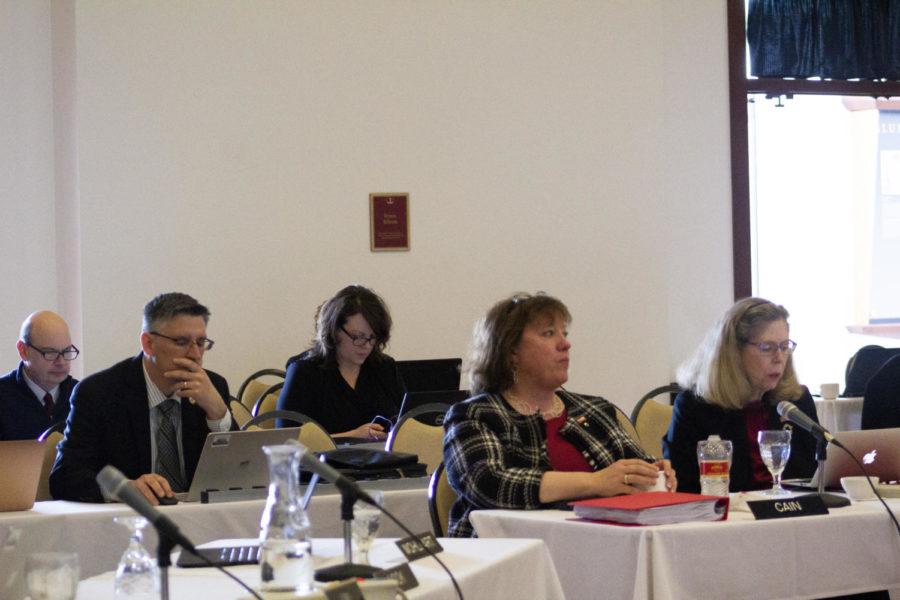Board of Regents votes to raise tuition for 2019-20 school year
Kennedy DeRaedt/Iowa State Daily
The Board of Regents held a meeting on Feb. 27 in the Reiman Ballroom at the Alumni Center. In their Aug. 1, 2018, meeting, Iowa State President Wendy Wintersteen expressed surprise at the decline in international student enrollment.
June 6, 2019
Tuition at Iowa State is officially going up for the next academic year.
The Board of Regents of the state of Iowa unanimously voted in favor of raising tuition and fees for resident students by 3.9% and 4.9% for nonresident students at Iowa State for the 2019-20 school year.
Tuition for nonresident students at the University of Iowa will go up by 1%. The University of Northern Iowa proposed no changes to tuition and fees, which was approved by the regents.
This round of hikes comes after increases last year at Iowa State of 3.8% for resident students at 4% for nonresident students, and tuition hikes the year before, as well.
Mason Zastrow, sophomore in political science at Iowa State, said he understands the need for the tuition increase.
“I understand that it’s needed because our Republican-controlled state legislature has little value for education, forcing the regents to raise tuition,” Zastrow said.
The Legislature did not fully meet the funding request Gov. Kim Reynolds proposed, underfunding it by $6 million in the last legislative session.
All proposed rates were unchanged from the first reading in April, said Brad Berg, chief business officer of the Board of Regents.
The regents also approved a proposal to increase application fees for domestic students by $10 at both Iowa and Iowa State.
Iowa State plans to join the “Common Application,” and “Coalition Application.”
The regents provided an explanation for raising application fees during their May meeting.
“Operations would be negatively impacted if these organizations hold a portion from each application submitted through its portals,” according to their May agenda.
Iowa State President Wendy Wintersteen gave the first institutional head report.
“It was a historic spring for Iowa State University,” Wintersteen said. “Our spring graduating class of 2019 was our largest ever, more than 5,300 students completed their degrees. We awarded our 145th honorary degree to Dr. Robert Easter, he is president emeritus of the University of Illinois.”
Wintersteen recognized Iowa State’s Goldwater scholars, along with students named Udall scholars and Iowa State’s winner of the Fulbright award, Collin Powell, graduate student in interior design.
The Iowa State president also discussed improvements the university will make for students with disabilities.
“As part of our commitment to enhancing our welcoming and inclusive campus environment, we are creating a centralized physical space on campus where students with disabilities can have easy access to assistive technology resources. The assistive technology lab will be located in Durham hall,” Wintersteen said.
The employment agreement for President Wintersteen was extended through June 30, 2023, and her 2017 deferred compensation plan was extended through the same date.
No member of the public signed up to give comment, and Board of Regents President Michael Richards adjourned the meeting.

















